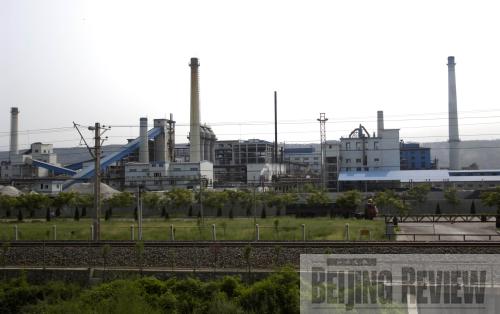|
 |
|
MIXED BLESSING: The Dongling Lead and Zinc Smelting Co. is confirmed to be the main source of lead pollution in Fengxiang County, Shaanxi Province (CHEN GANG) |
"I really fear it might do her permanent harm," said Lei.
Lei's daughter has to stay at least one week in the hospital, said Doctor Luo Lei.
"She needs three days of medication and four days of observation. At the end of the week she will receive another blood test to see if the treatment has been effective," he said.
Lead poisoning, Luo said, can harm the nervous and reproductive systems and cause high blood pressure and anemia. In severe cases, it can lead to convulsions, coma and even death.
Two other severe cases, 12-year-old Ma Yueyue and 7-year-old Ma Dongsheng were admitted to the same hospital. Their blood lead levels were 480 mg and 499 mg per liter, respectively, almost five times the normal limit.
Besides those with excessively high levels, other children affected by lead poisoning should be able to expel the metal from their bodies through non-medical treatments at home. The government has sent milk, dried vegetables and fruits to affected families, said He Hongnian, executive deputy head of Fengxiang County.
Residents also demanded free blood tests for people over the age of 14, but no action has been taken to find out how lead poisoning has affected adults.
The dilemma
This lead poisoning scandal has shed light on the dilemma facing many parts in west China, where industrial development threatens the environment and people's health.
The factory, which produces 100,000 tons of lead and zinc and 700,000 tons of coke, contributed 17 percent of Fengxiang County's gross domestic product in 2008. It helped this county to develop from the poorest one into one of the top counties in Baoji City. It offered jobs to villagers and some in the communities also made money leasing houses to migrant workers.
Now the whole village faces the possibility of both health and economic loss.
"People stopped buying my milk after they found out the village was polluted with lead," said villager Wen Guaiyan, who raises four milk cows.
Other villagers are unable to sell their vegetables, eggs and other farm products.
Scared by the specter of lead poisoning, parents are considering sending their children to other counties for education.
"As a poverty-stricken area, we have few choices for our economic development," He told China Youth Daily. "We are not at the same starting point as the east, where there are hi-tech, non-polluting industries."
Since the scandal broke out, the Fengxiang County Government began building new homes on August 6 for 425 families living within 500 meters of Dongling Lead and Zinc Smelting Co. The new homes are located about 1 km from their current residences. Villagers are expected to move into the new community within two years. The county government and local businesses are sharing construction costs, said He.
"But the relocation is way behind schedule," said Pu Yiming, chief of Changqing Township. Pu said a relocation plan was created in 2006 through which all the residents should already have been moved to a new area. "Of all the 581 families that should have been relocated by now, only 156 have moved to new homes."
The general manager of the plant, Sun Hong, said the county government pledged in a deal reached before the plant was opened to relocate all residents living within 500 meters of it within three years.
The delay, local officials said at a press conference, is due to "readjustments in the overall planning of the Changqing Industrial Park."
"I'm ready to move. The earlier the better, as long as the new place has water, electricity and easier access to transport," said Lu Tao, who lives 100 meters from the plant.
Some villagers doubt that the new place is immune from the lead pollution.
"To eliminate their worries about whether the new site could rid them completely of the lead pollution, we will soon invite experts on architecture, environmental protection and meteorology to re-evaluate the location," He said.
| 